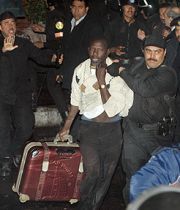UNHCR agency blamed for Sudanese refugee deaths
Jan 1, 2005 (WASHINGTON) — Arab and Middle East civil society groups are accusing a United Nations agency of collaborating with Egyptian police in action which caused the deaths of at least 25 Sudanese refugees in a downtown Cairo park on Friday.
 The refugees, including women and children, have been staging a public sit-in for the past three months protesting their treatment by United Nations High Commissioner for Refugees (UNHCR) and were demanding relocation to a third country.
The refugees, including women and children, have been staging a public sit-in for the past three months protesting their treatment by United Nations High Commissioner for Refugees (UNHCR) and were demanding relocation to a third country.
But Friday evening, a police force of nearly 4,000 officers cordoned off the Sudanese encampment, fired water cannons at them and beat them indiscriminately. Hundreds were dragged into buses and transferred to unknown destinations.
Some 25 people died in the clashes and a stampede, while dozens were injured. Eyewitnesses told the local press that the refugees abandoned their belongings and suitcases in the park as they fled the crackdown.
Egyptian civil society groups decried the use of force in a statement on Saturday and called what happed a “massacre” and “a full-blown crime committed by Egyptian security forces in collaboration with UNHCR against unarmed refugees, most of whom are women, children and elderly”.
Some 2,500 Sudanese refugees have been gathered at the park since Sep. 29 saying they would not leave until the UNHCR agreed to resettle them in European countries, as reportedly promised. They had fled Sudan after years of civil war.
The heavy-handed manner in which the Egyptian police handled the situation has brought strong condemnation by Arab intellectuals, civil society groups and human rights advocates.
Egyptian authorities said they acted in consultation with the UNHCR and with Sudanese diplomats in Cairo.
But Arab and Egyptian rights groups say the use of force was unwarranted and the situation could have been defused through talks with the refugees’ leaders.
The groups said they are joining forces to set an independent fact finding task force and persuade the Sudanese refugees to file suit in Egypt against ?’the crimes committed against them and the violations they suffered at the hands of the Egyptian government and the UNHCR”.
The groups have also demanded that they be allowed to visit the camps where the refugees are now held, to provide them necessary legal and medical aid. Organisations included the Arab Network for Human rights Information, Egyptian Anti-Globalisation Group (AGEG), El Nadim Centre and the Centre for Socialist Studies.
In a statement from Geneva, the UNHCR said the refugees were not protesting against the UN agency but were gathering “primarily to protest living conditions and to demand that they be resettled to third countries.”
UNHCR said, throughout the three-month crisis, it had maintained constant dialogue and mediation efforts with the refugees and that it had always said the situation needed to be resolved peacefully.
“There is no justification for such violence and loss of life,” high commissioner António Guterres, who took office in mid-2005, said from Geneva in a statement.
But the Egyptian government answered Guterres by saying that his agency had asked the police to intervene to end a long-running protest outside its Cairo offices.
The Egyptian Organisation for Human Rights, one of the largest and oldest in the region, said in a statement in Arabic on Saturday that UNHCR bears part of the blame. The group said the UNHCR has become so bureaucratic that it let the plight of the refugees drag on for too long.
In the view of the rights group, it was the UNHCR’s responsibility to guarantee refugee safety in the first place and suggested that the UN agency had abandoned the Sudanese leaving them open to the possibility of forced eviction from Egypt.
International human rights groups like Human Rights Watch chose to focus on the Egyptian government in their reaction to the killings and didn’t point to a role by the UN agency or the Sudanese diplomats in Cairo in the massacre.
“The high loss of life suggests the police acted with extreme brutality,” said Joe Stork, deputy director of HRW’s Middle East division. “A police force acting responsibly would not have allowed such a tragedy to occur.”
HRW said that the evident planning of the police operation to clear the park in Mohandiseen district meant that the police acted on the basis of a high-level policy decision.
Like the Arab and Middle Eastern groups, the New York-based organisation has called for a local investigation that looked at all levels of the police command, including the role of Egypt’s interior minister Habib al-Adli.
“The blood is still on the sidewalks, and already the government is blaming the Sudanese refugees and migrantsà an independent investigation is absolutely necessary to assess responsibility and punish those responsible,” Stroke said in a statement.
(IPS)
On the net:
